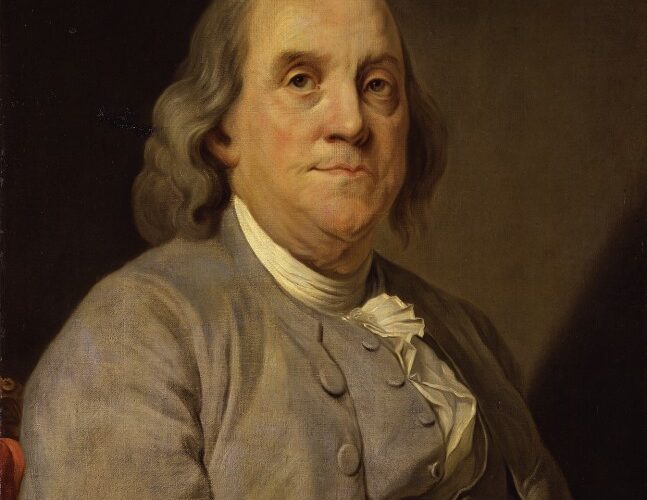Benjamin Franklin after Joseph Siffred Duplessis, based on a work of 1783
Theme: Political Revolution, American war of independence (1775 - 1783), American revolution, Trade, tariffs and taxes
Benjamin Franklin (1706–1790) was an American printer, inventor and scientist, who developed an international profile and went on to become a Founding Father of the United States of America, along with men like George Washington, Thomas Jefferson and Alexander Hamilton. He played a key part in the drafting of the Declaration of Independence, the defeat of Britain in the war, and the creation of the American Constitution.
In the 1700s a large area of North America, in what is now known as the USA, was controlled and governed by Britain. In 1765, the British government changed the tax rules for the people living in these American colonies. Large numbers of colonial Americans refused to pay these taxes, complaining they had no representation in the British Parliament and therefore no say over decisions made about their lives. A period of unrest followed with Americans boycotting British goods and staging protests, as well as electing delegates to a new Congress (colony-wide meeting). Britain responded by imposing increasingly tight regulations and sending more and more British troops to the American colonies. In 1775 military troops from many of the colonies fought back, beginning a war that escalated into the American Revolution.
Benjamin Franklin represented Pennsylvania at the Second Continental Congress, which met in his home town of Philadelphia, and helped steer the colonies towards independence from Britain, with whom he had lost patience. In the summer of 1776, Thomas Jefferson drew up the Declaration of Independence, with amendments by Franklin and others. It was ratified on 4th July 1776, now known and celebrated as Independence day. But Franklin’s most critical role came later that year, when he was dispatched to France to try to secure vital military and financial support from the French, without whom the war could not be won. Over the next years, Franklin applied all his skills and experience to winning this propaganda and diplomatic battle, in the courts and salons of Paris. His approach bore fruits, with France joining the war in 1778 and Britain recognising the United States as a new republic in the Treaty of Paris signed in 1783.
Benjamin Franklin cashed in on his celebrity and reputation to present a revolutionary idea of what an American was. He deliberately chose to wear a relatively plain suit like the one in this portrait, while engaging in diplomatic affairs in France in 1778, and often wore a simple fur cap, in contrast to the luxurious and decadent wigs and clothes of the French court, as if to make the point that the nascent United States represented very different values. Confident, pragmatic and sociable, his fresh approach earned him the full respect of the French people and, ironically, a celebrity status and esteem on a par with the French nobility.
Did you know..?
Benjamin Franklin is responsible for many famous and witty sayings still in use today, such as “in this world nothing can be certain except death and taxes” and “by failing to prepare you are preparing to fail”. When his fellow American Revolutionaries pointed out that they would have to hang together, he famously replied: “yes, we must, indeed, all hang together, or most assuredly we shall all hang separately.”
Sources & acknowledgements
This object description and its related educational resources were researched and written by our team of historians and education specialists. For further information see the item’s home museum, gallery or archive, listed above.
-
Education overview
You can access a range of teachers resources related to this object and more on our education page.
Please also see our glossary of terms for more detailed explanations of the terms used.
-
Curatorial info
- Originating Museum: National Portrait Gallery
- Accession Number: NPG 327
- Creator: Joseph Siffred Duplessis
- Technique: Oil on canvas
- Size: 28 in. x 22 1/2 in. (711 mm x 572 mm)
- Original record
-
Use this image
You can download this image for personal and educational use but please take note of the rights holder and license type below.
- Rights Holder: © National Portrait Gallery, London
- License Type:
Find it here
This object is in the collection of National Portrait Gallery



